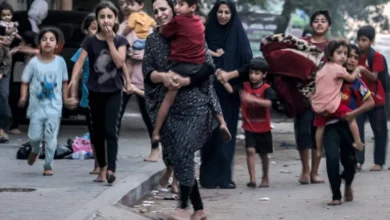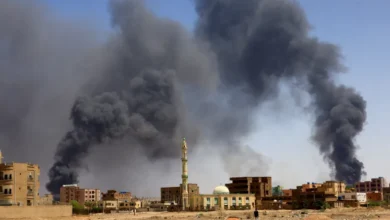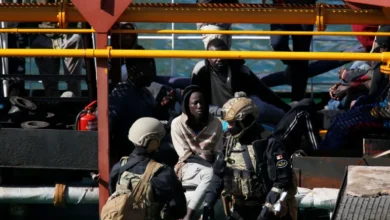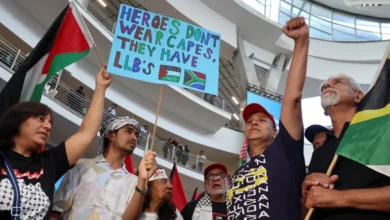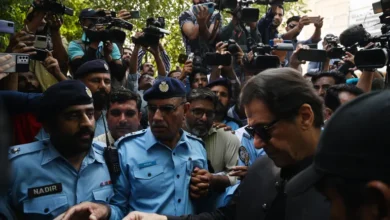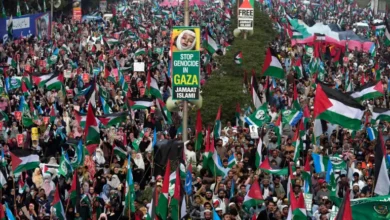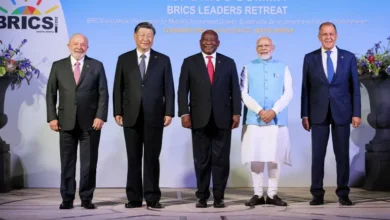Fanon’s conception of violence does not work in Palestine
Mark LeVine

Mark LeVine
In the immediate aftermath of the unprecedented Hamas attack on Israel from Gaza, my Facebook feed lit up with friends sharing variations of a famous quote by the Martinique-born anti-colonial philosopher and psychiatrist Frantz Fanon on their feeds, to the effect that the violence of colonialism can only, and will naturally, be met by the violence of the colonised. The actual quote is from Les Damnes de la terre (Wretched of the Earth), and can only be understood in the context of the fuller argument Fanon is making: “Colonialism is not a thinking machine, nor a body endowed with reasoning faculties. It is violence in its natural state, and it will only yield when confronted with greater violence.”
No one can deny Fanon’s brilliance or his pioneering and profound understanding of the psychological effects of colonial violence on the colonised and the coloniser (as a psychiatrist, he treated French colonial officers and Algerians alike and found them to suffer similar psychiatric ailments). But the second and more famously quoted part of Fanon’s argument is not comprehensible without the first part, and the first part – especially in the Israeli context – is in fact profoundly wrong.
Colonialism, especially settler colonialism – and even more particularly Zionist settler colonialism – is very much a “thinking machine” with very powerful and longstanding logic and rationalities that are the key to its success. Because of this, considering what “a greater violence” would look like and how it can be measured, never mind achieved, is a crucial task for those analysing and fighting colonial violence alike.
I have yet to see any plausible scenarios in which Palestinians acquire the means to deploy “far greater violence” vis-a-vis Israel/the Zionist entity for any length of time in any conceivable geostrategic balance of power. Even if Iran (the only major power that supports Palestine in any meaningful way), for example, wanted to deliver heavier weapons to Palestinians, Israel’s control over access points, as well as Egypt’s and Jordan’s, will prevent that from happening. Palestine is not Ukraine, supported by major powers and able to utilise land, water and air corridors to obtain an unending stream of weapons deliveries to fight a much larger and better-armed adversary. Quite the opposite, in fact.
More broadly, Palestine today is not Algeria in 1956, which was Fanon’s most important reference point. Nor is Israel France, with a metropole to which settlers can return (unless we consider Tel Aviv the metropole). There will be no long-fought war of independence resulting in the vast majority of Jews leaving à la française a reconquered Palestine. But there are several scenarios that could lead to a redux of the Nakba, as many Israeli politicians are now screaming for.
Moreover, when Fanon talks about the “cathartic” and “cleansing” effect of violence by/for the colonised in Peau Noire, Masques Blanc (Black Skin, White Masks), another oft-quoted argument, it’s important to recall that he is referencing first to the colonised “subjectively adopting a white man’s attitude”, not the use of violence to cleanse him or herself of the psychological illness of colonialism in preparation for the long struggle for independence. When the moment of revolutionary violence does occur, he explains in The Wretched of the Earth, it is still at the beginning of the struggle, when the long-degraded colonised subject “discovers that his life, his breath, his beating heart are the same as those of the settler. He finds out that the settler’s skin is not of any more value than a native’s skin; and it must be said that this discovery shakes the world in a very necessary manner.” At this moment, “violence … frees the native from his inferiority complex and from his despair and inaction; mak[ing] him fearless and restor[ing] his self-respect”.
In the case of Palestine, this kind of violence occurred in 1921, 1929, and most famously 1936, not in 1987 or 2000. And it built on a self-recognition of Palestinians as an independent nation that arose at the beginning of the 20th century, coterminously with Zionism.
My fear is that in focusing on the psychological component and power of violence, and the feeling of freedom and self-respect produced by violence such as that of the most recent mass attack, people are misplacing Palestinians at a far earlier stage of national development than they are today, which in turn leads to strategies of resistance that do not match the present state of national development or the strategic and political moment. This also enables Israeli leaders, such as Defense Minister Yoav Gallant, predictably to declare that “we are fighting human animals and we act accordingly” as Israel begins what can only be termed a death siege of the Gaza Strip, while much of the world nods in seeming understanding.
Indeed, for over 50 years of occupation, and 30 years of the post-Oslo Palestinian “self-rule” rather than “the native cur[ing] himself of colonial neurosis … through force of arms”, what has occurred (as I learned in interviews with therapists at the few mental health centres in Gaza as far back in the later 1990s through 2000s) is the passing on of trauma, with former Fatah prisoners tortured by Israel torturing Hamas members using the same techniques as the Israelis used on them – often screaming at their victims in Hebrew while torturing them in the very same rooms where they were tortured. Hamas has continued this cycle in the two decades of effective control over Gaza. And now we see this with crowds cheering kidnapped, beaten, and murdered Israelis.
Whatever catharsis this constitutes, it is not one that will lead to victory over an Israeli society that has been using violence against Palestinians as its own traumatic catharsis for 75 years, in a world that has a very high tolerance for Palestinian civilian casualties, with most people in the West still supporting Israel whenever there is a high level of Israeli Jewish casualties.
